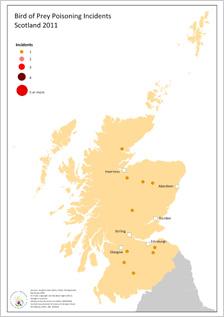Fall in the number of birds of prey being poisoned in Scotland
- Published

There were 10 incidents of poisoning of birds across Scotland in 2011
The number of incidents involving the poisoning of birds of prey fell by more than half in Scotland last year.
In total, 10 poisoning incidents were recorded in 2011, resulting in 16 dead birds. This compares with 22 incidents and 28 deaths, in 2010.
The Scottish government said that the results represented "a welcome decline" but that it was "no cause for complacency".
Seven buzzards, four red kites and a golden eagle were among the fatalities.
Environment Minister Stewart Stevenson said: "This is the fourth year we have published these maps and I very much welcome the reduction in poisoning numbers.
"I hope this proves to be the beginning of a continuing reduction in such cases, leading to the end of this outdated, dangerous and cruel practice."
He added: "Birds of prey are a key part of our ecosystems and a magnificent spectacle in our countryside. They are valued by locals and visitors alike."
Duncan Orr-Ewing, head of species and land management for RSPB Scotland, said: "We hope that this is the start of a downward trend in illegal poisoning in Scotland.
"In time this should also be reflected in an increase in the populations and ranges of some of our most vulnerable species, including golden eagles, hen harriers and red kites."
Douglas McAdam, chief executive of Scottish Land and Estates, said: "These statistics reveal the lowest number of cases on record for confirmed illegal poisoning of birds of prey since we started producing these hot spot maps.
"This is very welcome and encouraging news and clearly demonstrates substantial progress in this area."
The record high for bird poisoning deaths was 34 in 2006. The number in 2011 represents a fall of more than 50% and a 42% drop from 2010.
The fall has occurred at a time when the government said its laboratories at Science and Advice for Scottish Agriculture (SASA) were testing more intensively.
Supt Ewen West, of Tayside Police, who chairs the raptor persecution priority delivery group, believes the decrease was influenced by measures being taken to combat wildlife crime.
He said: "This reduction in poisoning incidents is in my view reflective of the ongoing work in relation to the prevention and investigation of such criminality."
Scotland's annual wildlife crime conference takes place on Wednesday at the Scottish Police College in Fife.
- Published23 July 2010
- Published20 July 2010